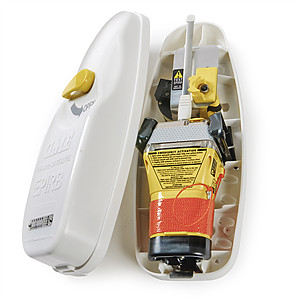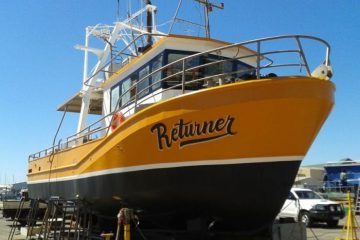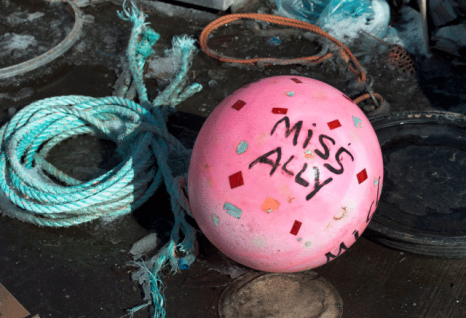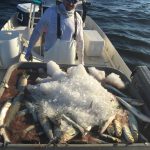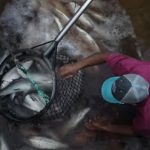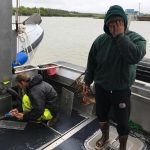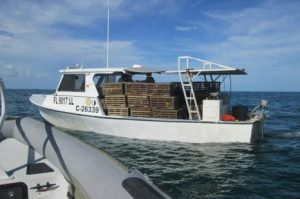Tag Archives: EPIRB

Coast Guard says two unresponsive people pulled from Atlantic
Two people were pulled unresponsive from the Atlantic Ocean on Thursday after an automated emergency signal was issued 45 miles southeast of Portland, the Coast Guard said. A fishing vessel located the people after the Coast Guard launched a search for the fishing boat Hayley Ann. Two people were on the vessel when an automated emergency beacon alerted the Coast Guard to a problem. >click to read< 18:49
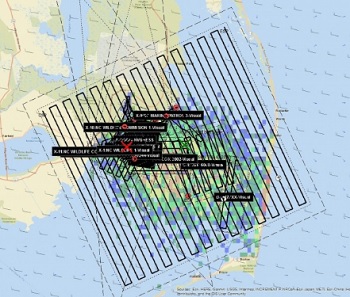
Coast Guard suspends search for two missing fishermen in Pamlico Sound
The Coast Guard suspended its search Thursday afternoon for two fishermen who were reported missing after the commercial fishing vessel Papa’s Girl capsized in the vicinity of the Pamlico Sound. Watchstanders at the Fifth Coast Guard District command center were notified Tuesday night by a distress signal that was sent from the vessel’s emergency position indicating radio beacon. >click to read< 14:58

Coast Guard suspends search for missing man after boat capsizes near Bodega Bay
The Coast Guard suspended their search Sunday morning for a man who was missing after Coast Guard crews rescued three people Saturday evening from a capsized commercial fishing boat approximately 30 miles northwest of Bodega Bay.,, An emergency position-indicating radio beacon from the 54-foot Miss Hailee notified Coast Guard Sector San Francisco watchstanders of a distress at approximately 5:30 p.m. Saturday. Video, >click to read< 08:23
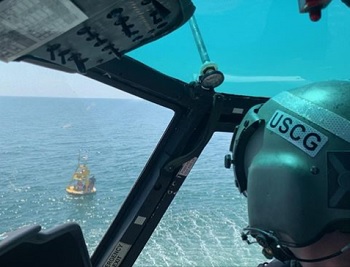
Coast Guard rescues four from NOAA buoy on Gray’s Reef
Four people are lucky to be alive after they were rescued by a Coast Guard detachment out of Air Station Savannah on Sunday afternoon. The group’s vessel took on too much water, so they were forced to abandon the craft and swim. They were able to find shelter on National Oceanic and Atmospheric Administration buoy. The Coast Guard was able to locate the group by tracking their Emergency Position-Indicating Radio Beacon. >click to read< 08:33
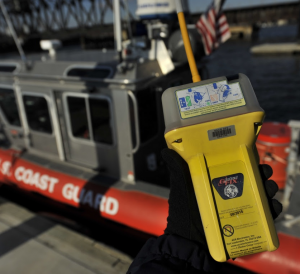
Coast Guard urges EPIRB education to save taxpayer dollars, lives
When the Coast Guard receives an EPIRB alert and cannot trace it to the owner due to missing or outdated registration information, they launch aircraft and boat crews to search the area for signs of distress. It costs approximately $15,000 per hour to fly a C-130 Hercules aircraft, $10,000 per hour to fly an MH-60 Jayhawk helicopter, and $5,000 per hour to operate a Coast Guard small boat. Since October 1, 2018, there have been 16 confirmed false alerts for distress beacons in Alaska that cost the taxpayer approximately $353,108. Of those 16 cases, three of the distress beacons were located in garbage dumps. The cost for searching for those beacons was approximately $35,000. >click to read< 14:53

Coast Guard rescues four Fishermen who abandoned ship south of Atka Island, Alaska
An MH-65 Dolphin helicopter crew rescued four people who abandoned ship after their boat began taking on water when it reportedly hit a rock south of Atka Island, Saturday. Coast Guard District 17 command center watchstanders received an Emergency Position Indicating Radio Beacon alert from the fishing vessel Clyde. Watchstanders were able to reach the fishing vessel captain’s wife who confirmed he was aboard the vessel relative to where the alert was coming from. >click to read< 15:15
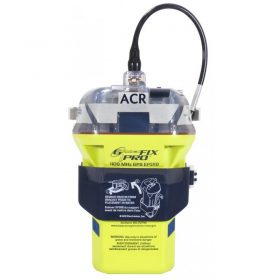
406 Day: National Campaign for Awareness of EPIRB, Emergency Locator Beacon Importance
Editor’s Note: Coast Guard members in your area may be available to discuss 406 Day and the importance of EPIRBs and PLBs.,,,Saturday, April 6, is 406 Day, a national campaign run by NOAA to spread awareness of the importance of emergency position indicating radio beacons, or EPIRBS, and personal locator beacons, or PLBs, in boating safety. In 2018, the Eighth Coast Guard District responded to over 200 distress signals from EPIRBS aboard aircraft and boats. An EPIRB works by transmitting a signal that is picked up by a satellite and then relayed to a rescue coordination center. >click to read<13:41
EPIRB distress beacon saves three from sinking boat near Chatham Islands
Three crew have been rescued from a sinking crayfish boat this morning thanks to a floating distress beacon that had only been recently installed. At 8.20am the beacon was activated from Western Reef, 32km northwest of the Chatham Islands. The owner, who was on land, confirmed there were three people on board the 10m cray fishing boat, Mary Ellen 2. Two fishing boards headed to the scene and picked up the three crew members from the bow of the partially submerged vessel. Rescue Coordination Centre NZ senior search and rescue officer Dave Wilson said the beacon saved their lives. >click to read<17:28

U.S. Coast Guard responds to over 700 false alerts in 2018, urges everyone to register beacons
After responding to over 700 false alerts in 2018, the Coast Guard is urging anyone with an emergency position indicating radio beacon to properly register their device. An EPIRB is a device that transmits a distress signal to a satellite system called Cospas-Sarsat. The satellites relay the signal to a network of ground units and ultimately to the Coast Guard and other emergency responders. Owners of commercial fishing vessels, uninspected passenger vessels that carry six or more people, and uninspected commercial vessels are legally required to carry an EPIRB. However, the Coast Guard recommends that every mariner who transits offshore or on long voyages should carry an EPIRB. >click to read<09:59
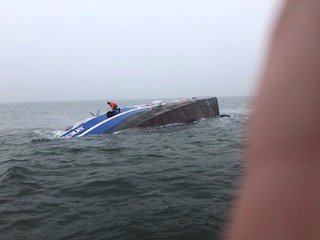
Coast Guard, good Samaritans rescue 4 from fishing vessel in the Gulf
The Coast Guard and good Samaritans rescued four people from a vessel 3 nautical miles south of Bayou La Batre, Alabama, Wednesday. The Eighth Coast Guard District watchstanders received an alert at 10 a.m. from an emergency position indicating radio beacon registered to the commercial fishing vessel Eunice Lemay with four people aboard. Coast Guard Sector Mobile watchstanders issued an urgent marine information broadcast and received a report from two good Samaritans, the commercial fishing vessel Erica Lynn and the sailing vessel J&B, of the Eunice Lemay keeled over with four people on its side. click here to read the story 19:24
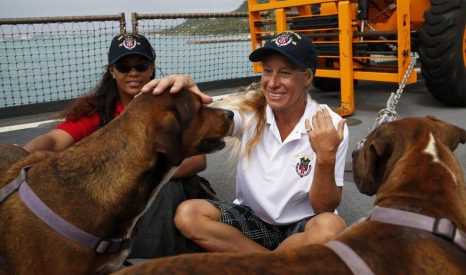
Doubt surrounds stranded sailors as Coast Guard reveals women had emergency beacon and never activated it
The U.S. Coast Guard announced Monday that the two Hawaii women who say they were lost at sea never activated their emergency beacon, adding to a growing list of inconsistences that cast doubt on the women’s harrowing tale of survival. Parts of their story have been called into question, including the tropical storm the two say they encountered on their first night at sea in May. National Weather Service records show no organized storms in the region in early May. When asked if the two had the radio beacon aboard, the women told the AP on Friday they had a number of other communications devices, but they didn’t mention the EPIRB. click here to read the story 08:37
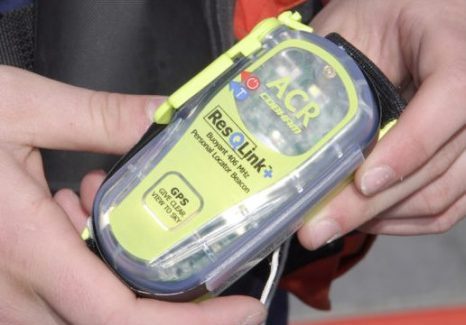
USCG Calls For PLBs On EVERY Life Jacket
In the United States Coast Guard’s upcoming El Faro investigation report, Captain Jason Neubauer USCG, Chairman of the Marine Board of Investigation, will recommend that all Personal Flotation Devices on oceangoing commercial vessels be outfitted with a Personal Locator Beacon.,,, A PLB (personal locator beacon) is a specific type of EPIRB that is typically smaller, less expensive, has a shorter battery life and unlike a proper EPIRB is registered to a person rather than a vessel. click here to read the story 09:41
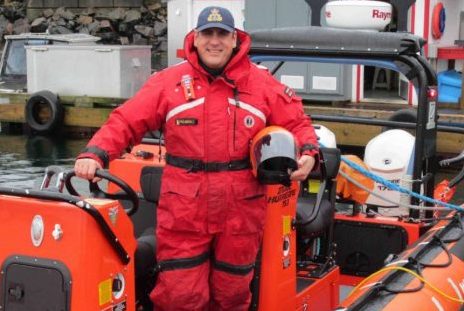
A coast guard vet raced to save freezing fishermen: ‘I remember my friggin’ heart pounding’
Alone in the darkness, eyes frozen shut, ice cracking off him with each step and a wind howling so viciously it repeatedly knocked him to the ground, an unfamiliar anxiety washed over Leslie Palmer. He’d had more than 20 years with the Canadian Coast Guard, some 700 rescues already to his credit, but this one was different. Palmer felt he was the one in peril. As he trudged along the shore of one of British Columbia’s northern islands, over a treacherous terrain of rock outcrops glazed in sheer ice, his goal was to reach the beached crew of a shrimp boat. The Larissa had emitted a distress signal hours earlier as it capsized in 185 km/h winds. It wasn’t certain there were survivors. Click here to read the story 08:51
Coast Guard searching for fishing vessel near St. George, Alaska
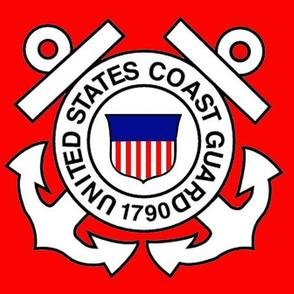 A U.S. Coast Guard Air Station Kodiak HC-130 Hercules airplane crew and two MH-60 Jayhawk helicopter crews are responding to an electronic position indicating radio beacon alert from fishing vessel Destination approximately two miles northwest of St. George, Alaska, Saturday. Coast Guard 17th District watchstanders in Juneau received the alert this morning and launched the aircraft crews. Six people were aboard the vessel, which is based in Seattle and often moors at Sand Point, said Petty Officer 3rd Class Lauren Steenson, U.S. Coast Guard 17th District Alaska. Sand Point is a community of about 975 people in the Aleutians East Borough.The HC-130 Hercules crew arrived on scene to commence search patterns at approximately 10:13 a.m. Two MH-60 Jayhawk crews arrived early Saturday afternoon to assist with the search. Two good Samaritan vessels, fishing vessels Silver Spray and Bering Rose, are assisting with the search. Citizens in St. George have assembled a search party to patrol the shoreline for any signs of the crew or vessel. The EPIRB has been recovered among a debris field containing buoys, a life ring from fishing vessel Destination and an oil sheen. “We are saturating the area with Coast Guard and good Samaritan assets and hoping for the best,” said Chief Petty Officer Joshua Ryan, Coast Guard 17th District watchstander. Weather on scene is reported as 30-mph winds, five to eight-foot seas and snowing. Air temperature is 20 degrees and sea temperature is 30 degrees. Link 22:36
A U.S. Coast Guard Air Station Kodiak HC-130 Hercules airplane crew and two MH-60 Jayhawk helicopter crews are responding to an electronic position indicating radio beacon alert from fishing vessel Destination approximately two miles northwest of St. George, Alaska, Saturday. Coast Guard 17th District watchstanders in Juneau received the alert this morning and launched the aircraft crews. Six people were aboard the vessel, which is based in Seattle and often moors at Sand Point, said Petty Officer 3rd Class Lauren Steenson, U.S. Coast Guard 17th District Alaska. Sand Point is a community of about 975 people in the Aleutians East Borough.The HC-130 Hercules crew arrived on scene to commence search patterns at approximately 10:13 a.m. Two MH-60 Jayhawk crews arrived early Saturday afternoon to assist with the search. Two good Samaritan vessels, fishing vessels Silver Spray and Bering Rose, are assisting with the search. Citizens in St. George have assembled a search party to patrol the shoreline for any signs of the crew or vessel. The EPIRB has been recovered among a debris field containing buoys, a life ring from fishing vessel Destination and an oil sheen. “We are saturating the area with Coast Guard and good Samaritan assets and hoping for the best,” said Chief Petty Officer Joshua Ryan, Coast Guard 17th District watchstander. Weather on scene is reported as 30-mph winds, five to eight-foot seas and snowing. Air temperature is 20 degrees and sea temperature is 30 degrees. Link 22:36
EPIRB notifies Coast Guard of disabled vessel with 3 people 63 miles offshore
 CHARLESTON, S.C. – Three people stranded on a disabled fishing boat 63 miles east of Mount Pleasant, S.C., are receiving Coast Guard assistance Friday because of a life-saving piece of equipment on board the vessel. The trio, too far offshore to communicate using their VHF-FM radio, activated the vessel’s Emergency Position Indicating Radio Beacon at 10:54 a.m., which instantly provided GPS coordinates, notifying Coast Guard watchstanders that a boat was in trouble. continued@uscgnews
CHARLESTON, S.C. – Three people stranded on a disabled fishing boat 63 miles east of Mount Pleasant, S.C., are receiving Coast Guard assistance Friday because of a life-saving piece of equipment on board the vessel. The trio, too far offshore to communicate using their VHF-FM radio, activated the vessel’s Emergency Position Indicating Radio Beacon at 10:54 a.m., which instantly provided GPS coordinates, notifying Coast Guard watchstanders that a boat was in trouble. continued@uscgnews
A rescue’s success hinges upon your EPIRB
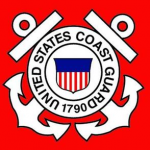 It was another early Friday morning for the crew of a Coast Guard HC-130 Hercules based out of Coast Guard Air Station Elizabeth City, N.C. Fifty-knot winds roared around the airframe while the crew scoured the dark cauldron of 20-foot seas below for a boat. Rain lashed the plane, reducing visibility to less than a mile. Radar was next to useless and no one had been able to contact the distressed vessel. Read more
It was another early Friday morning for the crew of a Coast Guard HC-130 Hercules based out of Coast Guard Air Station Elizabeth City, N.C. Fifty-knot winds roared around the airframe while the crew scoured the dark cauldron of 20-foot seas below for a boat. Rain lashed the plane, reducing visibility to less than a mile. Radar was next to useless and no one had been able to contact the distressed vessel. Read more






